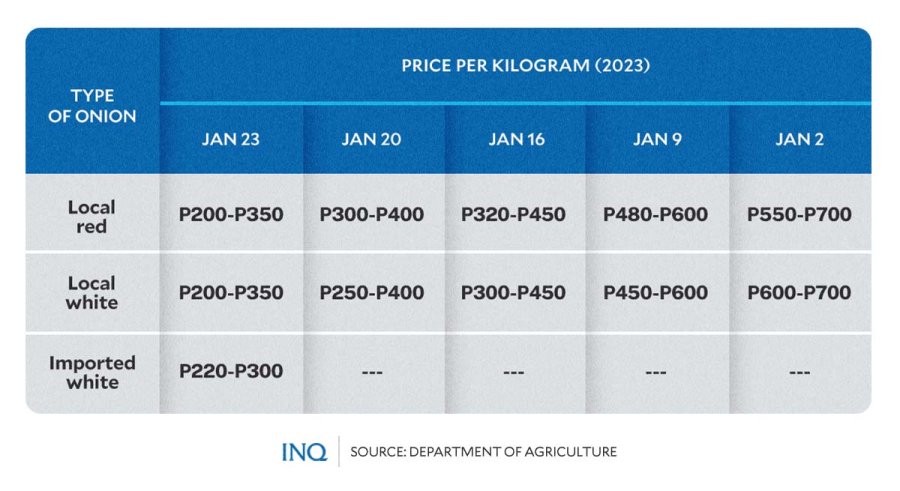January 26, 2023
MANILA — While the Philippine government, consumers, and farmers continue to bear the impact of high onion prices in the country, neighboring nations hardly face any issues in prices and supply of staple vegetable.
The price of red and white onion in local markets in the Philippines saw huge increases in the latter part of 2022 until last week. After that, the cost of a kilogram of onion skyrocketed and was sold at prices greater than a kilo of meat or a day’s worth of minimum wage.
The Department of Agriculture’s (DA) price monitoring showed that as of January 23, a kilogram of local red and white onion costs P200-P350 in local markets.
While the prevailing retail prices of locally grown red and white onions were lower compared to the all-time high of P700 per kilogram during the holiday season, prices were still higher compared to the retail price of P180 per kilogram a year ago.
As it turns out, prices of onions in the Philippines were also significantly higher than retail prices in markets across the globe, as well as in Switzerland—where President Ferdinand “Bongbong” Marcos Jr, who concurrently serves as the agriculture secretary, recently visited for the World Economic Forum.
Cheaper elsewhere
In the United States, a bag of 3 pounds of red onion (a little over 1 kilo) sold in a well-known grocery store has a retail price of $2.98 or around P163.
The retail prices of a 3-pound bag of sweet onions and a 3-pound bag of yellow onions sold in the same grocery store were $2.64 and $2.38, respectively—or at least P144 and P130.
Meanwhile, a popular grocery store in the United Kingdom sells a kilo of red onion for £1.05 or roughly P71, while a kilo of white onion was £1 or around below P70.

GRAPHIC Ed Lustan
Filipino netizens Jeric Dajutoy and Vikki Karr Roldan told INQUIRER.net that a kilo of onion could be bought for as low as 3 SAR or at least P44 in a local market in Jeddah, Saudi Arabia, while the same amount of onion was worth 600¥ or around P251 in a small supermarket located in Hanamatsu, Japan.
Even in Davos, where Marcos Jr. and world leaders and businessmen recently gathered for the annual World Economic Forum (WEF), onions in grocery stores were sold at half the price of those in the Philippines.

GRAPHIC Ed Lustan
A half a kilo of white onions sold at a branch of Coop, one of Switzerland’s largest retail and wholesale companies, was worth 1.40 Swiss francs, or P83 pesos, or about P166 per kilogram.
For 2.50 francs, or around P148.55, one can buy a 600-gram mixed bundle of red and white onions.
Onions as pasalubong
Amid the increasing prices of onion in the country, 10 flight crew members of the Philippine Airlines tried to bring home 40 kilos of onions and fruits from the Middle East as pasalubong.
However, on January 10, the Bureau of Customs (BOC) intercepted the PAL crew and confiscated their luggage due to a lack of import permit and clearance from the Bureau of Plant Industry (BPI).
According to BOC, travelers entering the Philippines cannot bring vegetables—regardless of quantity—without Plant Quarantine Clearance (for personal use) or Sanitary & Phytosanitary Import Clearance (for commercial use) from the BPI.
Initially, BOC spokesman Arnold dela Torre Jr. said in an interview that the agency considered filing criminal charges against the PAL crew for violation of the Plant Quarantine Law of 1978 due to the lack of a phytosanitary certificate and the Presidential Decree 1433 and Section 1404 of the Customs Modernization and Tariff Act for failing to declare the produce.
However, several senators expressed dismay that the PAL crew members are put in hot water for bringing onions to the Philippines as pasalubong, pointing out the supposed double standards that authorities purportedly have shown for punishing the airline personnel while letting big-time smugglers go free.
On January 19, Dela Torre Jr. disclosed that no charges might be filed against the flight crew members, explaining that Presidential Decree No. 1433 or the Plant Quarantine Decree of 1978 only provides the confiscation of agricultural products brought into the country for personal consumption.


